AcademicHelp is happy to present educational innovations that changed, inspired, and motivated teachers and students this year.

✅ AI Essay Writer ✅ AI Detector ✅ Plagchecker ✅ Paraphraser
✅ Summarizer ✅ Citation Generator
AI made a great entrance to schools and classrooms and showed new opportunities. Imagine a world where homework is no longer an issue for you, gathering information for an essay or a thesis is not puzzling, and even creating a fun and engaging lesson takes up to 10 minutes. It must be a miracle. Indeed, with the AI tools in education, it is now. Buckle up because AcademicHelp is taking you on a ride through awesome AI tools in education that amazed us in 2023.
AI has been making strides in academia and has succeeded. The year saw many new and fresh tools that were created with one purpose – to facilitate learning and make it accessible to everyone. Sure, ChatGPT was a hot topic but it was more of the “Ghost of Past Christmas”. Its versatility is not inclusive to the point that it can take care of complex research problems, or help teachers prepare comprehensive lessons, or say, try to learn a new language in a hip way. That was the cue for AI services that work with different education needs and focus on specific niches. They filled the gaps.
AI for Educators and Students
Doubts and preconceptions are still swirling around AI in the education field. While some perceive it as a menace and oversimplification, others see ‘the silver lining’ and show a beneficial approach for AI in academia. Teachers had mixed feelings about AI in the beginning. However now, with services that can enhance the lessons and engage students, they see things in a different light. Plus, there is a tool for every goal.
For learners. Using the power of AI is not about writing a prompt to ChatGPT. The technological uptick goes beyond that. It changes the terms ‘boring‘, ‘lame‘, and ‘trivial‘ to ‘exciting‘, ‘engaging‘, and ‘significant‘. AI transforms traditional educational experiences, making learning more dynamic and tailored to individual student needs.
The AcademicHelp team is delighted to present you with the top-notch 5 AI tools that can bring a spark to your educational journey.
In learning you will teach, and in teaching you will learn.
Phil Collins
Eduaide.ai: By Teachers for Teachers
A great utility toolkit in the AI arena is Eduaide. Born as an idea from two educators, this service touches upon all big and small tasks that appear daily in the classroom. With over 100 resources, every educator can find one that covers their teaching objective. From an outline of a lesson and reading exercises, this service helps teachers with the fun aspect as well. Bingo cards, quests, and Jeopardy are there.
Have an idea to make learning more effective? Eduaide welcomes different requests and approaches to teaching. All you need to do is leave your insights in the special form and witness creating history with this AI-powered assistant. Most importantly, Eduaide.ai follows its motto “By Teachers, For Teachers” and ensures educational accessibility to everyone everywhere.
The AcademicHelp team interviewed the co-founder of Eduaide.ai, Thomas Thompson, to sum up the academic year.
A*Help: What was 2023 for you in a nutshell?
Thomas: Equal parts exciting, hopeful, and unpredictable. No one knows definitively which direction the emergence of generative AI will take. It was in this uncertain space that we discovered Eduaide’s identity, less a pure AI tool, and more an integrated platform for instructional design—a place where teachers can access the tools they need to plan a lesson without juggling countless tabs and resource subscriptions.
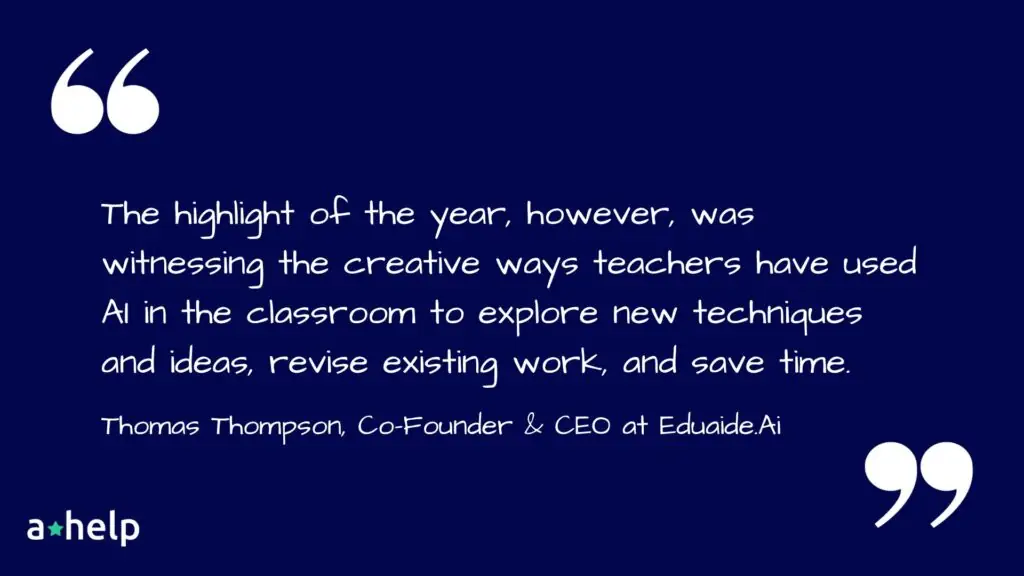
A*Help: What changes did Eduaide.ai undergo?
Thomas: Eduaide is not a general tool. It is built for teachers. The path the application has taken to be what you see today was directly influenced by the teachers who have used it so far. The changes we’ve made to the platform are those that make this collaboration with AI more intuitive. Tools like ‘The enhance button’ and ‘Suggested pairs’ cut down on the intimidating blinking cursor. Writing strict generative parameters and guardrails encourages the implementation of evidence-based practices. Additionally, we’ve expanded the range of tools for differentiation, functions for stability, and redundancies to ensure consistent uptime and worry-free access at the enterprise—whole school—level. We also launched Eduaide Pro, our monthly subscription service at $5.99, to help cover costs and keep the platform operational over the long term. We do not want the cost, however, to be a barrier to accessing high-quality instructional material. Therefore, we launched a scholarship program where any teacher facing financial hardship can reach out to us, and explain their situation, and we have granted 100% of those requests free access to Eduaide Pro for a year.
A*Help: What are your predictions for the industry in 2024?
Thomas: I can’t say for sure, because who knows what could happen. However, I suspect we may see the consolidation of big tools as larger firms fold in the capabilities of smaller ones. However, this may be coupled with the expansion of tools with marginal effects as the technology seeps into more specialized fields and niches. Eduaide sets itself apart by identifying more with the second category than the first. We are agile and nimble to match the ever-changing context as different models and affordances reveal themselves. We ferry teachers between different AI tools on a single integrated platform. The idea, of course, is to get rid of friction and thus save time through small efficiencies, and make evidence-based practices more broadly accessible.
A*Help: Do you think teachers will start to embrace more AI in the classroom?
Thomas: We certainly seem to be trending in that direction, but if the history of tech adoption in schools is a guide, the degree to which teachers are successful in embracing the technology will be contingent on how well they understand the range of affordances and boundaries that the technology presents. A teacher must know what the technology can do and how that may augment or redefine the kinds of tasks they engage with. AI makes accessing information far less costly than ever before. How does that affect the kinds of things we can do in planning and delivering instruction? It’s these questions that drive Eduaide’s commitment to being design forward, but evidence-based.
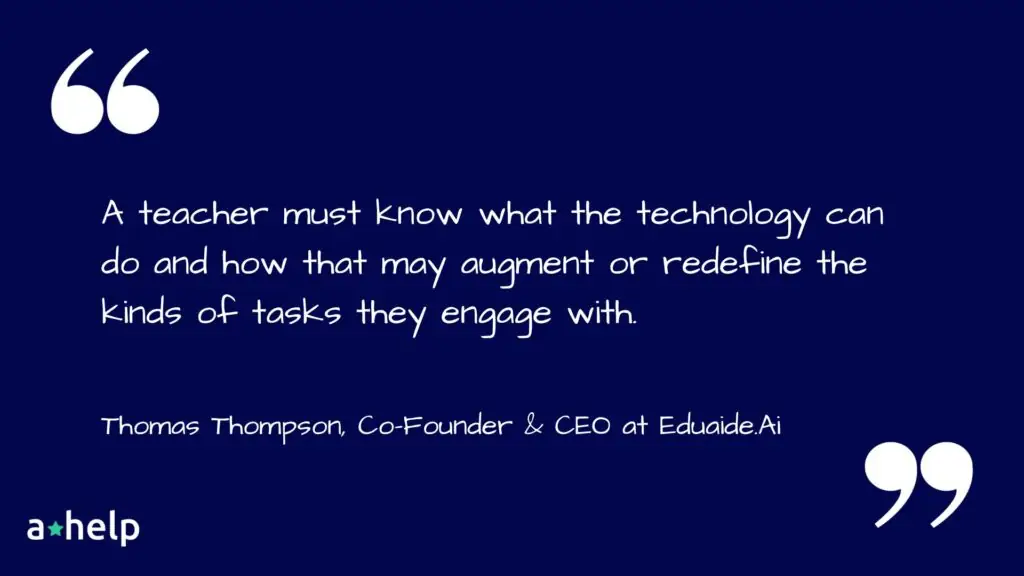
Curipod: Learn Together
Imagine the following, your 5-year-old students have short attention spans, and you need to come up with a captivating activity. Or you have to prepare a bunch of different presentations with colorful and informative visuals. Even if you need to turn a mundane reading summary into a storytelling show, then you are at the right place, Curipod can handle any classroom task.
Curipod caught the AcademicHelp team’s attention because this tool makes teaching and learning accessible for everyone with its free version. If once in your lifetime you want to see a kid glued to the screen, do it with Curipod. With this platform student participation will increase, says Gretchen Cuccio, a math teacher.
“I am a 30 year veteran of math education, and I found Curipod one night when I was looking for ways to increase student participation. I tried it the next day and I was hooked. The students were actually excited to use it! I LOVE that they each have their own whiteboard and that we can use their responses as great conversation starters.”
Educators can truly benefit from this AI-powered tool by joining their community for teachers. This is a place for like-minded individuals to share ideas, feedback, and insights. This community perfectly aligns with Curipod’s mission:
“We are on a mission to help teachers spark curiosity, discussion and critical thinking in the classroom.”
Additionally, this October Curipod united teachers and specialists in AI for a whole week together with their innovative event Curicon. This conference was all about using cutting-edge technology in new ways to make education better. This event was a great opportunity for learning new things, sharing thoughts, and working with others on using AI. It’s all about making classes more fun, fair, and effective.
Consensus: Search Engine for Research
The number of PhD students increases every year with more being eager to pursue advanced studies and groundbreaking research. Becoming a pro in a chosen field requires a lot of dedication. And sometimes, researchers-in-the-making are lost under the piles of information. This is where Consensus steps in as a guiding source that bridges the gap with the help of AI.
This AI tool knows how to simplify academic research and find the right answers. Why should you have faith in it? Simply because Consensus provides access to 400 million scholarly articles from the leading global journals and authors. One of the most significant achievements is that this platform is a place for a million users who can conduct research effectively.
Eric Olson co-founder & CEO at Consensus, kindly shared with us a comprehensive update on the tool’s recent progress and future aspirations.
A*Help: What was 2023 for you in a nutshell?
Eric: 2023 was an incredible year for Consensus. In a nutshell, 2023 was all about delivering what our users were asking for. We came into the year with a small group of passionate super users and had so much to improve in our product, our goal was to deliver for these users. We were able to ship dozens of new features and it led to us growing our user-base from 10k users to 1 millions users! It all happened because we had amazing users who helped shape our product.
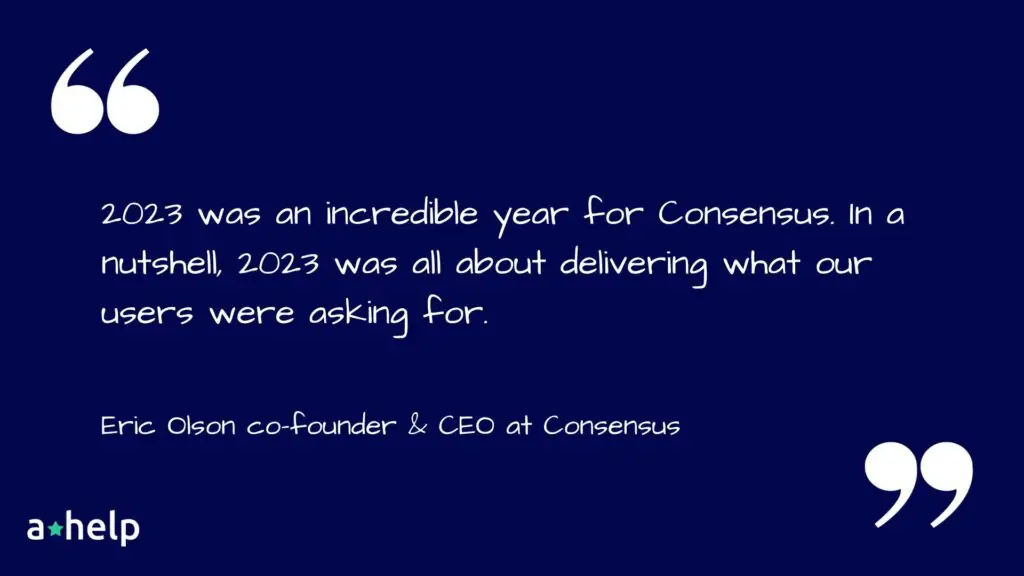
A*Help: What changes did Consensus undergo?
Eric: Consensus underwent too many changes to count in 2023! We shipped features that summarized insights across many papers like our GPT-4 summary and Consensus meter. We shipped features that helped users assess the quality of a study like our study snapshot feature and our AI-powered search filters. And, most importantly, we shipped a massive update that we dubbed Consensus 2.0, that improved every part of the product, most notably improving our core search relevance by 25%.
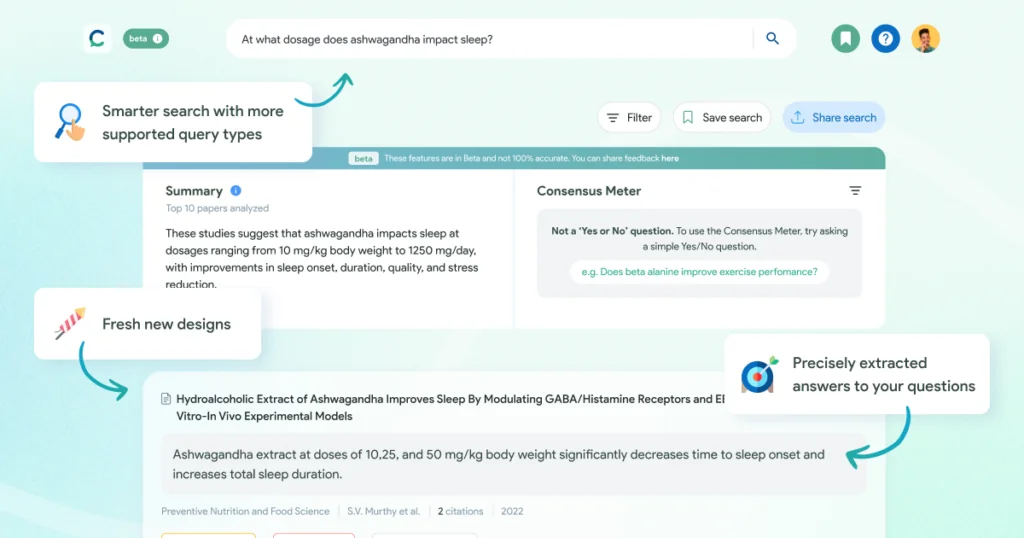
A*Help: What are your predictions for the industry in 2024?
Eric: At the top line, our industry will only continue to grow. AI in education is a no-brainer use-case that has the ability to help so many people in a variety of ways. I think that we will begin to see teachers, administrators and others continually get more comfortable using these products and having their students use these products. This will enable companies like us to develop our tools in an impactful way that actually meets the needs of those in the classroom. This will lead to all products that have real traction with users to take massive leaps forward in 2024 and help solve the problems of the end users.
HelloHistory: Unforgettable History Classes
Having fun while memorizing 61 British kings and queens, or exploring the strategic intricacies of Napoleon’s campaigns (watching a film with Joaquin Phoenix won’t help), or delving into the rich heritage of the Ming Dynasty and the Great Wall in Chinese history is finally possible with HelloHistory.
“We built the Hello History app to make connecting with history easier and more engaging. Currently, our team is on a mission to help schools prepare generations for an AI-ready society.”
Stas Shakirov, co-founder at HelloHistory
Any user can ask Abraham Lincoln “What were his plans for reconstructing the United States after the Civil War had ended?”, inquiry Che Guevara “What drove him to embrace Marxist ideology and become a key figure in the Cuban Revolution?”, and chat with Cleopatra about the biggest misconception about her rule and legacy on your phone on the way to classes.
Now, the HelloHistory team, in partnership with teachers, has launched a school-friendly web version Humy.ai. There, educators can create an engaging lesson with around 1,000 historical figures from ancient times to the 21st century and 40 classroom-ready assignments. Immersive historical exploration is guaranteed.
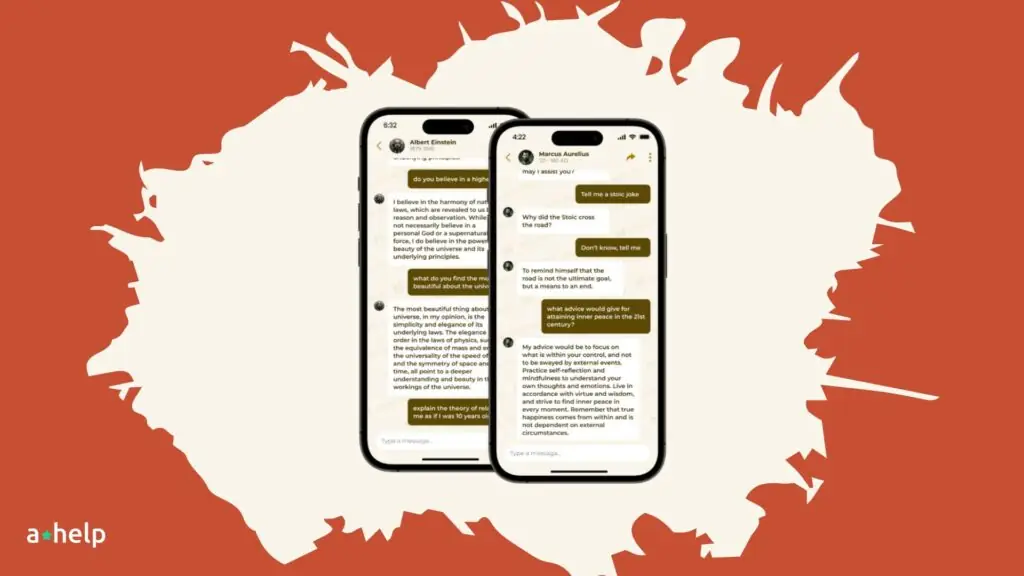
MagicSchool.AI: Plan Lessons Faster
Educators do admire accessibility, so MagicSchool.AI is up to the task. The reason for the effectiveness of this platform is the fact that it’s brought for you by a teacher. MagicSchool.ai is a huge working space with a plethora of nifty features. What is on the agenda for today: to plan a lesson, schedule email newsletters for families, add comments to the report cards, and prepare rubrics for a debate lesson? Sounds like a lot, and Magischool.AI can do a lot. Plus, with their recent update, this AI-powered service can help with inclusivity in the classroom. The Social Stories Generator creates easy-to-understand stories for different situations.
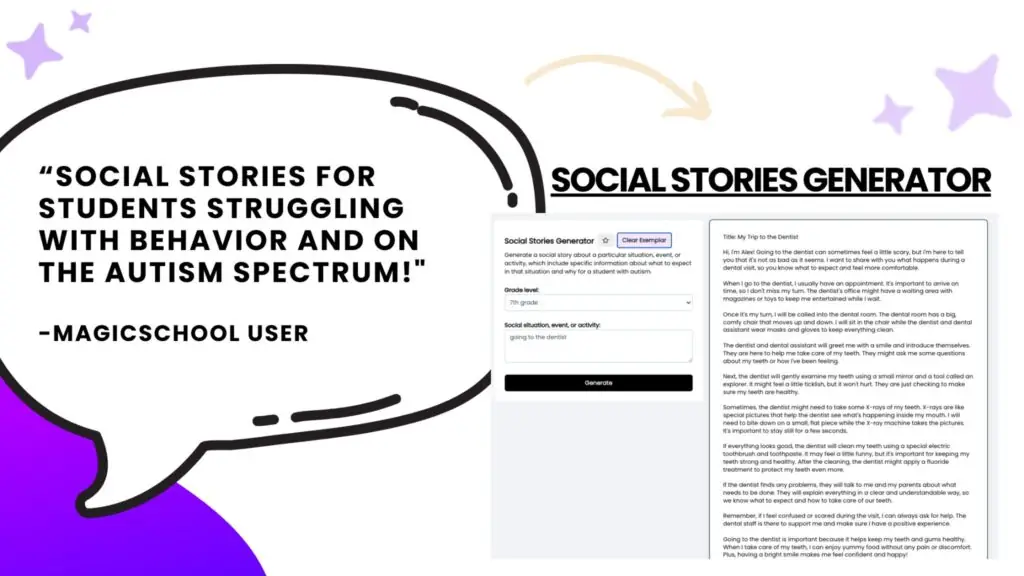
MagicSchool.AI is one of the few platforms that has built a name for itself in 6 months, has over 800,000 active users, and partners with higher education institutions to bring an AI assistant to every teacher and every classroom. This platform fueled the interest of many educators around the states, from NYC on the east coast to LA on the west. With more than 50 tools to offer, this service can address the true needs of educators. MagicSchool.ai celebrates many successful milestones and goes by the motto “Teaching smarter, not harder, with the magic of AI”.
All in all, the buzz about AI in education really makes sense when people use it right. Sure, this cutting-edge technology still needs certain polishing and updates. However, these tools have proved that in collaboration with humans, it is possible to create more efficient and personalized learning environments.
Follow us on Reddit for more insights and updates.





Comments (0)
Welcome to A*Help comments!
We’re all about debate and discussion at A*Help.
We value the diverse opinions of users, so you may find points of view that you don’t agree with. And that’s cool. However, there are certain things we’re not OK with: attempts to manipulate our data in any way, for example, or the posting of discriminative, offensive, hateful, or disparaging material.